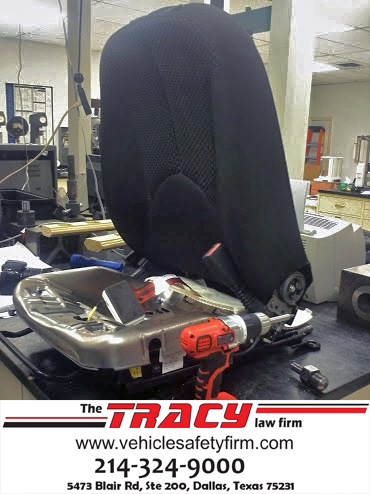A jury has awarded $1.8 million to the family of a Texas teenager who was killed when the 2005 Hyundai Tucson sport utility vehicle her sister was driving veered off the road and rolled over. Though Sarah Goodner was wearing a seatbelt at the time of the accident, she had reclined her seat so far back that she slipped out of the seat and was thrown from the vehicle as it rolled.
Goodner’s parents sued Hyundai, alleging that the Tucson’s seat had a design defect that allowed their daughter to recline to an unsafe angle. Safety experts at the trial explained that seats should not be reclined past 45 degrees while the vehicle is in motion because of the high risk for a passenger ejection.
Hyundai agreed with the safety experts and argued that it was the passenger’s responsibility to operate the seat in a safe manner. The automaker cited the owner’s manual, which they believe clearly warned against reclining to an extreme angle. Hyundai explained that the extra degrees of seat adjustment are intended for use only while the vehicle is parked.
“From our view, it was a tragic accident, but there was nothing defective about the vehicle,” explained Jason Erb, an attorney for the automaker.
Todd Tracy, the attorney who represented the Goodner family, dismissed the warning in the owner’s manual as “fine print” and claimed, “Hyundai could have saved a life with a system currently used by another automobile company that automatically returns a reclining seat to the upright position in the event of a car accident,” an apparent reference to the optional Pre-Safe system found on some high-end Mercedes-Benz models.
 Pre-Safe was first introduced on the Mercedes S-Class flagship sedan in 2002 (the 2010 Mercedes S-Class retails for $87,950) and tries to anticipate an impending collision based on heavy braking or various sensor readings. If such a condition is detected, Pre-Safe will close the windows and sunroof, tense the seat belts, and begin to raise a reclined seat to better position the occupant for impact.
Pre-Safe was first introduced on the Mercedes S-Class flagship sedan in 2002 (the 2010 Mercedes S-Class retails for $87,950) and tries to anticipate an impending collision based on heavy braking or various sensor readings. If such a condition is detected, Pre-Safe will close the windows and sunroof, tense the seat belts, and begin to raise a reclined seat to better position the occupant for impact.
What Mr. Tracy failed to explain is that Pre-Safe is limited by the speed of the electric motors in the seat. Even if Pre-Safe were fitted to the Hyundai Tucson that the Goodner sisters were driving, it is unlikely that the seat motors would have been able to raise Sarah’s fully-reclined seat to a safe position in the fractions of a second available before the rollover.
The optional Mercedes Pre-Safe system attempts to better position occupants for an impact by tensing the seat belts and raising the seat back if reclined.
For its part, the federal jury seemed to understand the complex nature of this case. This is the first time a jury has ever found a reclining seat to be responsible for a death in a motor vehicle accident. And though $1.8 million was awarded to the Goodner family, Hyundai was only assigned 45% of the fault. The automaker will only be responsible for $810,000 if the verdict is upheld in appeals court.
Beyond the tragedy of a young person’s death and the jury’s complex verdict, this case once again raises the question of personal responsibility in motoring.
The Goodner family argues that it is unreasonable to expect for every passenger to read the owner’s manual but safety experts and automakers agree that today’s technology can only prevent so much. Even cutting-edge systems, like Pre-Safe, may not have prevented this loss of life.
Automakers and industry suppliers are working hard to develop new features that can prevent accidents like the one the Goodner sisters experienced. Until the day comes when our motorways are perfectly safe, this case poses the question: should reclining seats be more heavily regulated or should consumers take responsibility for their own safety?
As Sarah Goodner’s father put it, “This is the tip of the iceberg, because almost every car uses the exact same [seat reclining] system.”
Mr. Tracy has been holding the vehicle manufactures liable for their negligence in safety of the vehicle’s occupants due to numerous reasons. His law office, The TRACY Law Firm in Dallas is specialized is handling defective vehicle accident and injury cases all over the nation for more than two decades.
Contact the law firm online, or, call at 214-324-9000 if you or your loved ones are seriously injured in an accident. Find out if you have a vehicle crashworthiness case.
Monday 6th May, 2013 | Source: The TRACY Law Firm, Honk

